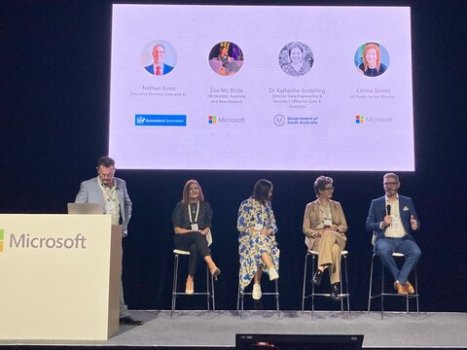
SA is working with the other states on a common AI assurance framework built on the NSW model and hopes to see something ready by the middle of this year, an industry event has heard.

Dr Katherine Enderling, Director of Data Engineering and Security with the SA Office for Data Analytics, said during a panel discussion hosted by Microsoft that data governance needs to be front and centre when it comes to AI.
That means making sure that ethics, principles, and data security govern the application of AI in the public sector, she told the Microsoft AI Tour last week.
Dr Enderling cited the example of using IA to pick up traffic crimes from images captured by a roadside camera.
“What sort of images do we get when we look into people’s cars and what are we going to do with these images?” she said.
“What happens when people start getting automatic letters saying you weren’t wearing a seatbelt but the photo clearly shows they are? Did the AI actually work? Is the AI algorithm performing the way we need? If there’s a decision that’s affecting outcomes, is there a human at the end looking at the picture?
“Then you have to go to court to contest a fine, and that costs money and time. So you need very easy access to a human that will help you contest that decision and explain why it was made.”

Enabling citizen trust
Dr Endling said it’s crucial to enable citizen trust in AI services.
“It’s huge for government because we want to be able to deliver better services, we really want to be able to help people, but if we don’t have that trust, they’re actually not enabled and we don’t have the mandate from the public to be able to do it,” she said.
“So for government, building trust and maintaining it – because its so easy to lose – is a really big deal, because when we have it we can encourage people to share their information and use it. “
Dr Enderling said the SA government is currently working with the other states and Commonwealth to build an AI governance framework with common ethics principles based on the one currently in operation in NSW.
“That’s going to be middle of the year, (when we are hoping to have it) put up through the federal committees,” she said.
“That’s definitely going to help build trust.”
Policy and legislation is also important, Dr Enderling says.
She says Australia would do well to look overseas to the US, the UK and EU, which all have relevant legislation or executive orders with varying levels of balance between regulation and innovation.
“Australia is in a really good place to look at how it’s been done overseas, what the impacts are and where we want to land,” she said.
Public servants positive about AI
Meanwhile, Queensland’s Executive Director of Data and AI Nathan Bines cast doubt on the presumption that there’s fear in the public sector about AI taking away jobs.
“Overall I think people in the public sector are really positive,” he said. “Let’s face it, we’re human. If someone gives us a tool to make our work easier, especially the boring parts, they want more of it.”
Dr Enderling said there was a role for AI to be work alongside public servants.
“How do we build teams that work best together with AI and humans, and build on the strength of both?’ she said.
“What we feel is that we are actually very overworked and we’d love to be delivering so much more.”
Comment below to have your say on this story.
If you have a news story or tip-off, get in touch at editorial@governmentnews.com.au.
Sign up to the Government News newsletter